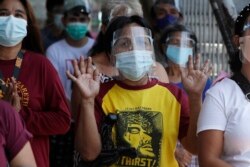On April 5, the government of the Philippines extended a lockdown in Manila and four outlying provinces to help stem the spread of SARS-CoV-2, the virus that causes COVID-19.
The populous archipelagic country has been hard hit by the pandemic, with 812,760 cases and 13,817 deaths as of April 7 — the second-highest numbers in the region, behind Indonesia.
On April 2, the Philippines recorded the highest-ever single-day infection rate, at 15,310. New cases exceeded 10,000 the following day.
Philippines President Rodrigo Duterte has been accused of mishandling the pandemic, with critics alleging he rolled out vaccines too slowly. Estimates suggest less than 1% of the country’s 110 million people have been vaccinated.
That has led some to seek alternative treatments.
On April 5, Philippine Congressman Mike Defensor announced on Facebook that he would distribute the antiparasitic drug ivermectin for COVID-19. He said the drug will be offered free of charge to residents of Quezon City, in the National Capitol Region, who do not have access to vaccines.
Defensor contracted COVID-19 and claims ivermectin aided in his recovery. Late last month, he called on the country’s Food and Drug Administration (FDA) to allow ivermectin prescriptions to treat the virus.
Representative Enrico Pineda also supports using ivermectin to treat COVID-19.
He filed a resolution with the Philippines’ House of Representatives calling on the country’s FDA to explain why it ruled against the use of ivermectin as a coronavirus treatment.
Pineda said clinical trials in many countries had shown ivermectin aids in the battle against COVID-19 when used in conjunction with vitamins and other supplements.
Defensor also filed a resolution supporting the use of ivermectin to combat COVID-19.
On April 2, Pineda’s son Enzo, an actor with more than 668,000 Twitter followers, tweeted out support for his father’s actions.
“Proud of my dad for spearheading the approval of ivermectin as an affordable drug to fight covid-19,” Pineda wrote. “I have friends who recently recovered from the virus who can testify that the drug works and I’m also using it now as a preventative medicine.”
However, claims that ivermectin is an effective treatment against COVID-19 are unsubstantiated, and health watchdogs have warned against off-label use of ivermectin, saying it could be harmful.
According to the U.S. National Institutes of Health, ivermectin is an antiparasitic drug used to treat tropical diseases, including onchocerciasis, helminthiases and scabies. It can also be used to prevent heartworm disease in some animal species, as well as treat internal and external parasites.
On April 5, a Philippines presidential spokesman issued a statement denying Duterte had ordered the country’s health agency to authorize the use of ivermectin to treat COVID-19.
On April 7, Health Undersecretary Maria Rosario Vergeire announced that giving away ivermectin as a treatment for COVID-19 violates a law against distributing and promoting unregistered pharmaceuticals.
The Philippines FDA also issued an advisory against purchasing ivermectin veterinary products for use against COVID-19, noting that ivermectin products “for human use are in topical formulations under prescription use only.” It added that drugs for specific species of animals “are often highly concentrated and can be highly toxic to humans.”
The World Health Organization (WHO) has recommended that ivermectin only be used to treat COVID-19 in clinical trials, adding that the evidence it is an effective COVID-19 cure is “inconclusive.” A guideline development group of international panel of experts is looking into the ivermectin’s effectiveness against COVID-19.
Reviewing data from 16 randomized trials, the group found: “[T]he evidence on whether ivermectin reduces mortality, need for mechanical ventilation, need for hospital admission and time to clinical improvement in COVID-19 patients is of very low certainty, due to the small sizes and methodological limitations of available trial data, including small number of events.”
Rabindra Abeyasinghe, the WHO representative to the Philippines, reinforced that position during an April 5 news conference, saying that “ivermectin has not proven efficacy against COVID-19. Even if we look at it from a preventive perspective, [there is] no evidence that supports it.”
He also pushed back against anecdotal reports, saying that the efficacy of ivermectin to treat COVID-19 must be evaluated through clinical trials.
“More than 95% of [COVID-19 patients] recovered without specific treatments. So if you give those patients a particular drug and see that that drug cure them, that is not science; that is not evidence. And this is what is happening again with, possibly, ivermectin,” Abeyasinghe said.
The U.S. Food and Drug Administration has warned against using ivermectin to treat COVID-19, saying it “has not reviewed data to support use of ivermectin in COVID-19 patients to treat or to prevent COVID-19.”
The European Union’s European Medicines Agency (EMA), which evaluates and supervises medicinal products, has likewise found that using ivermectin to prevent and treat COVID-19 is currently not suitable outside of “well-designed clinical trials.”
The EMA said clinical trial results have been mixed, “with some studies showing no benefit and others reporting a potential benefit.”






